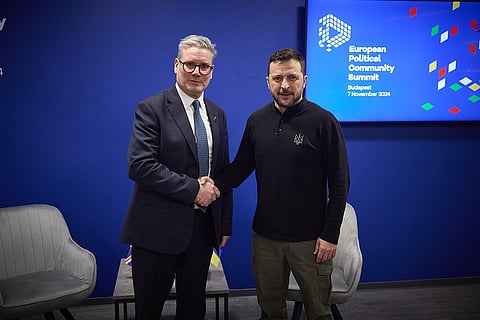

British Prime Minister Keir Starmer has called on Russian President Vladimir Putin to agree to an immediate ceasefire in Ukraine if he is serious about pursuing peace. Starmer’s remarks came at the conclusion of a virtual meeting on Saturday with leaders from the “coalition of the willing,” a group of nations supporting Ukraine. He criticized the Kremlin’s “dithering and delay” in responding to a U.S.-proposed ceasefire and condemned Russia’s “continued barbaric attacks” on Ukraine, which he said contradict Putin’s stated desire for peace.
“In the event of a ceasefire, we emphasized the need for strong monitoring arrangements to ensure that any violations of a deal are identified and called out,” Starmer said. The meeting included representatives from approximately 25 countries, including European partners such as France and Italy, as well as Ukraine. Leaders from Australia, Canada, and New Zealand, alongside officials from NATO and the European Union, also participated.
Coalition Moves to “Operational Phase” of Support for Ukraine
Starmer announced that the coalition is now transitioning to an “operational phase” focused on practical planning to support Ukraine. He stressed the importance of securing a “just and lasting peace” with the backing of partners across the EU, Canada, Australia, New Zealand, and others, including Japan.
“My feeling is that sooner or later [Putin] is going to have to come to the table and engage in serious discussion. But we can’t sit back and simply wait for that to happen,” Starmer told the group, underscoring the need for immediate action.
The meeting followed a U.S. proposal for a 30-day ceasefire in Ukraine, which Ukrainian President Volodymyr Zelenskyy has endorsed. Notably, the United States was not represented at the meeting, reflecting a shift in its approach to the conflict since the return of President Donald Trump to the White House. This change became particularly evident after Trump’s tense exchange with Zelenskyy in the Oval Office on February 28.
Putin’s Conditions and Western Skepticism
While Putin has expressed support for a truce in principle, he has outlined numerous conditions that must be clarified before agreeing to a ceasefire. U.S. Secretary of State Marco Rubio has expressed “cautious optimism” about the possibility of a deal following a meeting between Putin and U.S. envoy Steve Witkoff on Thursday. However, Starmer remains skeptical, accusing Putin of playing “pointless games” with the peace proposal.
“I think that means strengthening Ukraine so they can defend themselves—militarily, financially, and through further support from all of us,” Starmer said, emphasizing the need for concrete commitments from Western leaders.
Zelenskyy Calls for Security Guarantees and Reconstruction
Ukrainian President Volodymyr Zelenskyy, who also attended the summit, reiterated that a ceasefire could have already been achieved if not for Russia’s actions. He called for security guarantees to be “reflected on paper” and expressed hope that the U.S. would exert pressure on Russia to end the war. Zelenskyy described recent U.S.-Ukraine talks in Jeddah as a “diplomatic victory” and thanked the EU for its plan to allocate €150 billion to strengthen Europe’s defense capacity.
On the topic of Ukraine’s reconstruction, which was discussed by both Turkey and Germany, Zelenskyy said it reflects a belief that the war can be ended. He also emphasized the need for international support, including some form of “boots on the ground” after a ceasefire, though he acknowledged skepticism among some allies. Strengthening Ukraine’s military, he added, is essential to ensuring future security.
As the conflict continues, the international coalition remains focused on bolstering Ukraine’s defenses and pushing for a sustainable resolution to the war.